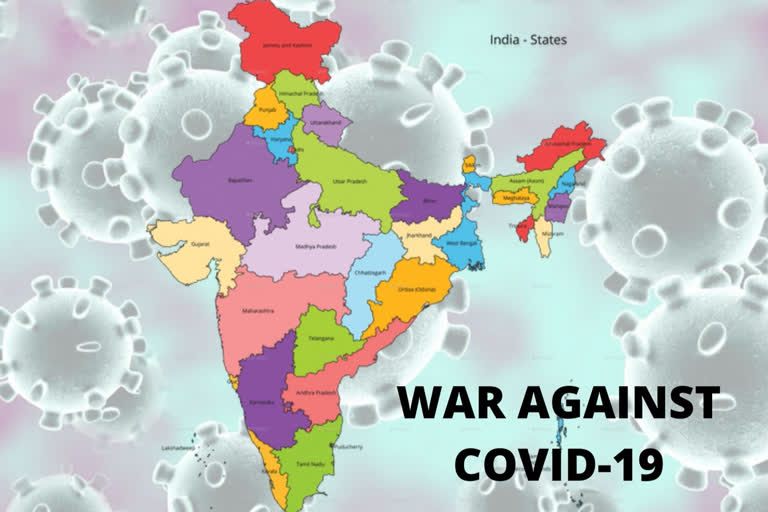Hyderabad(Telangana): We are at war. There is no other way to describe what we are witnessing around the globe as it battles the coronavirus. The enemy may be invisible, but it is deadlier than the foes that India has faced in the past. We do not know the human toll that this war will finally take, but it has already disrupted our national well-being, our way of life, and potentially our future.
In the past, wars were fought by those in uniform and left the Indian population, mostly untouched. All that has changed, and today every citizen has to become a soldier. This transformation from a citizen to a citizen-soldier may not be easy, and some lessons from military life could perhaps provide guidance.
When an infantry soldier attacks an enemy position, artillery gunners 15 kilometers behind the frontlines have already pounded the area with thousands of high-explosive shells to stun the enemy. Engineers blast a path through the minefield to minimize infantry casualties, and logisticians sitting in rear bases ensure that ammunition, food, and other essential supplies reach the fighting soldier. If each person does not perform his task perfectly, the battle will be lost.
Today, we are facing a situation where there are no frontlines and safe areas, no rich-poor distinction. While our doctors, nurses, police officers, and emergency staff are leading the war against coronavirus, every citizen must also become a support soldier to ease their burden.
Read: China offers to help India fight coronavirus pandemic
In South Korea, the first coronavirus case was detected on 20th January, and four weeks later, cases stood at only 30. Patient 31, as she is now infamously called, refused initial testing and continued with her social engagements. The Shincheonji Church cluster, which she attended while infected, accounts for 60 percent of all cases in South Korea. This is a clear lesson that if anyone of us slips up, we will all lose the fight.
One factor that makes the military fight efficiently is explicit adherence to orders. Samuel Huntington has called obedience the supreme military virtue. If instant obedience is not forthcoming, wars cannot be fought, much less won. In the fight against this coronavirus, our buy-in must be absolute and our commitment resolute. While plans could be open to critique and accountability, the cost of inaction is severely compounded due to the nature of the threat we are facing.
History will be the judge of whether decisions taken by the political leadership during this crisis were right or wrong, but this is not the time to debate these decisions. Have faith in the system and act in solidarity as we head into the fight to defeat the enemy.
In the military, we often say that no plan of operations survive beyond the first contact with the enemy. As bullets start flying, the situation changes and soldiers who are in the midst of the fight have to adapt to changing circumstances quickly. However, even though soldiers on the ground may adopt a different approach than the original plan, the overall aim remains primary and constant.
As we citizens engage in this war against the coronavirus, we will face unexpected challenges. In coping with these, we may have to adopt different strategies from what we had initially planned, but we must not forget the aim – to halt the spread of coronavirus. All our actions must be directed towards this single mission.
Finally, it must be noted that soldiers fight because they know that they have the full support of the government. There is an unwritten covenant that is a mutual obligation between the soldiers and the state. While soldiers are called upon to be ready to make personal sacrifices, the state is obliged to provide adequate safeguards and compensation to soldiers and their families.
The war on coronavirus will demand sacrifices from all of us. In return, the government must do all it can to ease the burden. Essential supplies of food items and medicines, health services for the sick and aged, and maintenance of essential services must be ensured.
Read: Putin, Modi exchange views on situation surrounding coronavirus pandemic
The economic impact of prolonged lockdown is already visible. While the daily wagers are the most apparent sufferers, every business sector will be hit, and unemployment could soar. The International Monetary Fund expects a global recession that will be at least as bad as the downturn during the ‘Great Recession’ of 2008. The government must quickly announce a fiscal and monetary stimulus to mitigate the impact on the poor and senior citizens as well as to protect businesses.
A country can have the most well-equipped army, but it cannot win a war unless soldiers are willing to put their lives at risk. Today something greater is at stake, not just our lives but our way of life. I do not mean that citizens should risk their lives, but a certain amount of sacrifice will have to be made if we are to achieve victory in our battle. Mahatma Gandhi’s words remind us that “the future depends on what you do today.”



